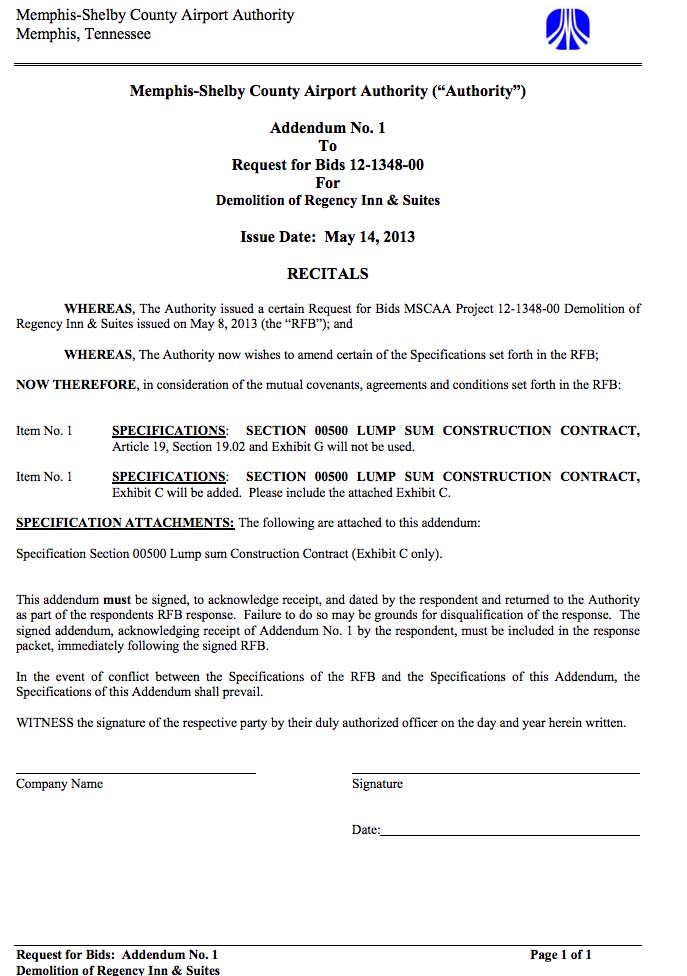
A small contractor that prompted Memphis surety agents in 2011 to begin to push for a state law strengthening requirements for surety bonds also was the first contractor to be canned from a job because of the new law.
Local surety brokers spotted the contractors’ forged Chubb surety bond following up a complaint from a competitor that submitted a second-low bid. The new law required vigilance and persistence by the local surety industry and may be an example to other states where surety fraud is found. Chubb has sued two men who operated as individual sureties in connection with the forged bonds issued to more than 20 contractors in nine states.
The Memphis-based contractor, Nelson Inc., has apparently had severe financial problems in the last few years. The company’s website describes it as an African-American owned Small Business Administration certified HUB Zone site manager, supervisor and administrator.
Nelson Inc. in 2011 sought protection in federal bankruptcy court, where it tangled with at least one of its creditors, according to court records. A judge last year terminated the company's voluntary Chapter 11 bankruptcy proceeding.
Nelson Inc., which has performed a lot of work in Tennessee and Georgia and has been commended by Memphis city officials, did not respond to several requests for comment. According the company’s website, it was founded in 1972.
In 2011, Nelson bid on an $8-million interceptor sewer relocation project and members of the Associated General Contractors regional chapter say they pointed out that the individual surety named on that bid did not exist. Recognizing the legal loophole which allowed the bid to be accepted, surety agents who belong to the AGC, Jay Madden and Larry Bryant, contacted the city of Memphis to see how such a mistake could happen.
Madden and Bryant say that they found that Memphis’ only requirement for a surety bond is that it be “acceptable.” That’s when they began to push, through West Tennessee AGC Chief Terry Lotz, for a state law to ensure that all contract surety is backed by a U.S. Treasury-listed company.
After passage by state legislators, Tennessee Governor Bill Haslam signed the measure into law in April and it went into effect in July. So when Lotz received calls in late July from some of the members of his group about a new $458,000 project awarded to Nelson Inc., for demolition of the Regency Hotel & Suites at the Memphis-Shelby County Airport, it was the first time anyone had called him to reference the new regulation his chapter had shepherded through the state legislature into law.
The second lowest bidder for the hotel demolition, Memphis Wrecking, had complained about Nelson being awarded the contract, says Lotz.
Surety agent members of the AGC chapter thought something could be wrong about the surety guaranteeing the contractor’s work, too, so in conjunction with Lotz they approached the Memphis-Shelby County Airport Authority to get a copy of the Nelson bid bond document to inspect it.
Lotz, Bryant and Madden inspected the documents and found them to be fraudulent.
To begin with, “Why in the world would the document’s Power of Attorney reference people who are signing on behalf of the surety [who] come from Sydney, Australia?” Lotz recalled saying to himself. “And why would the signing attorney, Roy Frederick Amos, be listed as from Sydney, with an office in Jacksonville, Florida?”
Madden, who is a surety bond agent and principal in Harris Madden Powell Insurance in Memphis, immediately called Chubb, named on the documents as the underwriter, to let Chubb know someone from a broker named Asurety Partners seemed to be the bond producer (Asurety is one of the names used by Steve Stokeling, whom Chubb has charged in a civil lawsuit with fraud).


Post a comment to this article
Report Abusive Comment